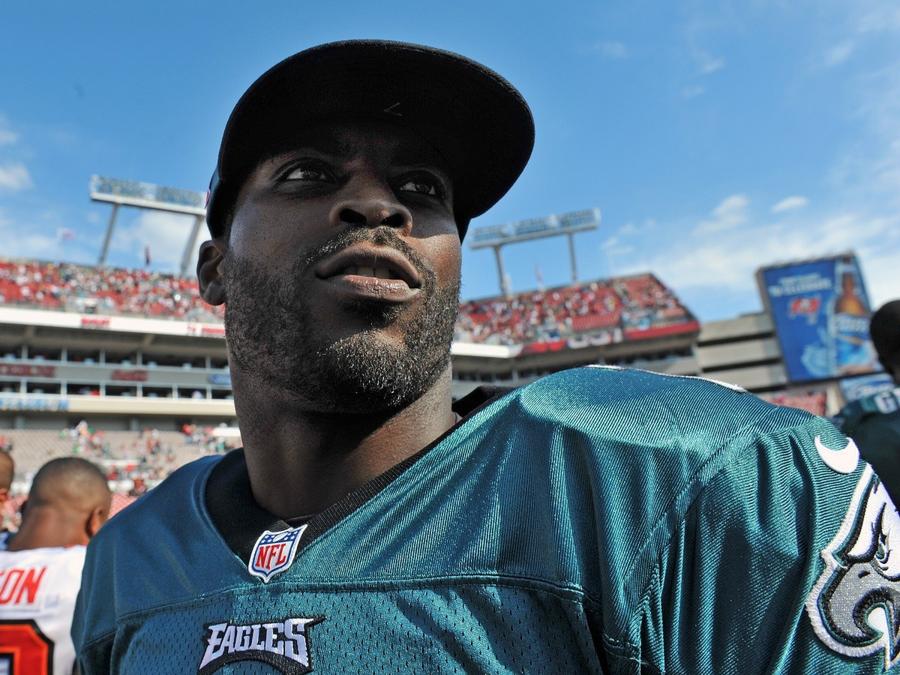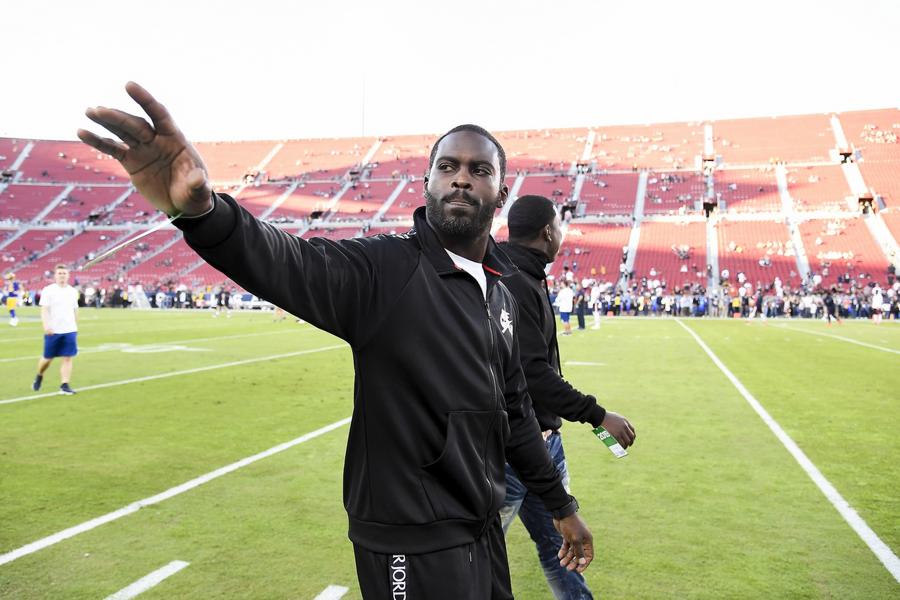What Is Michael Vick's Net Worth and Salary?
Michael Vick is a retired American professional football player who has a net worth of $4 million. Michael Vick is best known for playing with the Atlanta Falcons and the Philadelphia Eagles. After an exceptional college football career, Michael was selected as the first overall pick by the Falcons in the 2001 NFL Draft. During his time with the Falcons, Vick played as a quarterback in a slightly unorthodox fashion, focusing on rushing plays more than passing. Because of this approach, Michael broke a number of records during his career. He became the first NFL quarterback to ever rush for more than 1,000 yards during a single season, and he finished his career with a record-breaking 6,109 rushing yards.
As you likely know. Michael Vick's promising football career was marred by controversy after his involvement in a dog-fighting ring was discovered. Vick was arrested in 2007 after federal investigators discovered evidence of a dog-fighting operation at his property in Virginia. He was indicted on July 17, 2007. He pled guilty a month later. A month after that, on November 19, 2007, Vick voluntarily began serving his prison sentence. He was released in May 2009. He was given a second chance by the Eagles and continued his NFL career with an even greater level of performance. After finishing his career with the New York Jets and the Pittsburgh Steelers, Vick officially retired in 2017.
As we detail in the paragraphs below, Michael earned roughly $58 million from NFL salaries before AND after his imprisonment. He declared bankruptcy in 2008, citing $18 million owed to a variety of creditors. He intentionally filed for Chapter 11 bankruptcy instead of Chapter 7. Filing Chapter 7 would have voided the $18 million. He ultimately paid off that entire debt. So, of his roughly $30 million in post-tax NFL earnings after his arrest, roughly $18 million went to creditors. It's likely that several million more went to lawyers, agents, and accountants.
Career Earnings
During his NFL career, Michael earned $116 million from salary alone. He earned approximately $57.5 million before the criminal charges and $58.5 million after the charges. Vick's original $130 million contract with the Atlanta Falcons was negated after his legal troubles.
By 2006, Vick's annual income from salary and endorsements was over $25 million, making him one of the highest-earning athletes in the world. Michael returned to the NFL in late 2009. He was actually named Comeback Player of the Year in 2010. On Monday, August 28, 2011, Michael Vick signed a 6-year, $100 million contract with the Philadelphia Eagles. This new contract included $40 million in guaranteed cash and worked out to an annual salary of $16.5 million. At the time, Vick was just the third athlete in professional sports history, joining Derek Jeter and Shaquille O'Neal, to sign more than one $100 million+ contract. In 2014, he signed a 1-year $5 million contract with the Jets.
Court documents would later show that Michael spent approximately $30 million on taxes, creditors, lawyers, and accountants between 2007 and 2012.
2008 Bankruptcy
Around the time he entered prison, Michael was forced to declare bankruptcy. At the time, he owed an estimated $18 million to a variety of creditors. During this period, he earned 12 cents an hour mopping floors at Leavenworth prison. When he left prison, his net worth was negative. To make ends meet, he even took a job as a construction worker.
At the peak of his NFL career, Vick accepted the services of Michael Smith, a financial planner. This proved to be a bad decision. Although Smith assured Vick that he would have a net worth of $100 million by 2010, he actually reached the end of the decade with debts of over $20 million.
On October 2, 2012, court documents revealed that Vick had spent 95% of his 2008-2012 income, roughly $30 million, paying taxes, creditors, lawyers, and accountants. At the time he filed for bankruptcy, he had a very distinct choice to make:
- A) He could file for Chapter 7 bankruptcy protection and walk away from all his debts.
- B) He could file for Chapter 11 and honor every penny of debt. Michael chose Chapter 11.
Vick chose option B. In other words, he actually went out of his way to keep his debts active so he could pay them down.
Court documents in 2014 revealed that Michael had paid down 87% of his debt by that point. He was fully debt-free within a few years. In order to pay off his debt, he chose to live off $300,000 per year, giving every other penny to his debtors. Once his debts were paid off, he continued living off $300,000, putting anything leftover into savings. He had ostensibly learned a valuable lesson after years of poor financial management, bad investments, and lawsuits.

Al Messerschmidt/Getty Images
Early Life
Michael Dwayne Vick was born on June 26, 1980, in Newport News, Virginia. Growing up in a crime-ridden neighborhood, Vick identified sports as the only real way out of poverty. He became an excellent football player during his high school years and continued to impress after enrolling at Virginia Tech.
College Career
Michael Vick played college football at Virginia Tech from 1998 to 2000, where he was a hugely successful quarterback who revolutionized the position with his dual-threat capabilities.
Vick's two-year playing career at Virginia Tech revolutionized college football and established him as one of the most dynamic quarterbacks in the sport's history. After redshirting in 1998, Vick exploded onto the national scene in 1999 as a redshirt freshman, leading the Hokies to their first-ever undefeated regular season and a shot at the national championship.
His 1999 season was spectacular: he threw for 2,065 yards and 13 touchdowns while rushing for 682 yards and nine touchdowns, showcasing an unprecedented combination of elite speed and arm strength. He finished third in Heisman Trophy voting and led Virginia Tech to the Sugar Bowl against Florida State. Though the Hokies lost 46-29, Vick's performance (225 passing yards, 97 rushing yards, two total touchdowns) cemented his status as college football's most exciting player.
In 2000, Vick continued his strong play despite battling an ankle injury, throwing for 1,234 yards and eight touchdowns while rushing for 617 yards and eight touchdowns. He finished with a 20-1 record as Virginia Tech's starter before declaring early for the NFL Draft. His impact went beyond statistics – Vick's electrifying style helped transform Virginia Tech from a regional program into a national powerhouse and influenced how the quarterback position would be played for years to come.

Jemal Countess/Getty Images
NFL Career
Michael Vick was selected first overall by the Atlanta Falcons in the 2001 NFL Draft, becoming the first African American quarterback taken first overall. His impact was immediate – while sharing time with Chris Chandler in his rookie year, Vick showed flashes of the revolutionary talent that would change how the quarterback position was played.
By 2002, Vick was Atlanta's full-time starter and led the Falcons to a historic playoff victory at Green Bay's Lambeau Field, the first time the Packers had ever lost a home playoff game. His 2004 season was perhaps his peak with Atlanta, leading the Falcons to the NFC Championship game while becoming the first quarterback to rush for more than 900 yards in a season.
Vick's initial run with Atlanta ended abruptly in 2007 due to his arrest and subsequent imprisonment for dog-fighting charges. After serving 21 months in federal prison, he signed with the Philadelphia Eagles in 2009 as a backup to Donovan McNabb. In 2010, Vick got his chance to start again and delivered his finest passing season, throwing for 3,018 yards and 21 touchdowns while leading the Eagles to the playoffs and earning Comeback Player of the Year honors.
The 2010 season included one of Vick's most memorable performances – a Monday Night Football game against Washington, where he threw for 333 yards and four touchdowns while rushing for 80 yards and two more scores in a 59-28 victory. However, injuries and inconsistent play marked his remaining years in Philadelphia, and he was replaced as starter by Nick Foles during the 2013 season.
Vick went on to play backup roles with the New York Jets (2014) and Pittsburgh Steelers (2015) before officially retiring in 2017. He signed a one-day contract with Atlanta to retire as a Falcon, bringing his career full circle.
Despite the interruption of his prime years, Vick's NFL statistics remain impressive: he threw for 22,464 yards and 133 touchdowns over his career, but his rushing numbers truly set him apart. His 6,109 career rushing yards remain the most by a quarterback in NFL history, and his dynamic playing style influenced a generation of mobile quarterbacks who followed.
Legal Issues
Even before his dog-fighting incident, Vick struggled with a number of legal issues. In 2004, he was arrested for distributing marijuana. In 2005, he was sued by a woman who claimed he had given her an STD. The lawsuit was settled out of court. In 2006, Vick was fined $10,000 for giving booing fans the middle finger.
By 2007, reports had begun to surface that suggested Michael was involved in staging dog fights. After a search warrant was obtained, Vick's property was searched. Evidence of illegal dog fighting was found. More details emerged, and it became clear that drugs and gambling were involved. Even worse, the dogs were being abused, tortured, and, in some cases, executed. Cries of public outrage were swift, and Vick and his associates were indicted on felony charges. Michael was accused of financing the entire operation, and he later admitted that this was true. He also admitted that he was personally involved in the execution of between 6 and 8 dogs.
To make matters worse, Vick tested positive for marijuana during this ordeal. This meant that he had violated the conditions of his release, and he was put under house arrest. In the days leading up to his sentencing, Michael donated $1 million to care for many of the surviving dogs. Eventually, he pleaded guilty in 2008 to a felony charge of dog fighting and was given a 3-year sentence. He was released early in 2009.

(Photo by Kevork Djansezian/Getty Images)
Real Estate
In 2008, it was reported that Michael Vick and his wife had sold a property in Davie, Florida, for $1.4 million. The buyer was none other than Lawrence T. Guy, who was serving as a defensive tackle for the New England Patriots at the time. Vick's former property spans 6,295 square feet and sits on a 21,250-square-foot plot of land. Michael had originally purchased the lakefront property in 2013 for $1.32 million. The five-bedroom home features a home theater, a pool, and a coffee bar. Fans of Michael Vick may remember seeing this home on an episode of "Baller Wives."
Around 2009, Michael put his Duluth, Georgia, home for sale with a starting bid of $3.2 million in an attempt to help pay off his debts. Here is a video tour of his former Duluth home:
In 2020, Michael and his wife listed another home in Florida for $2.4 million. Located in Plantation, this 9,2800-square-foot home features six bedrooms, a media room, a guest house, a custom pool, an outdoor kitchen, and a basketball court. Vick and his wife originally purchased the home for $2.38 million in 2018. He ultimately sold this home for $1.4 million.
In February 2022, Michael and his wife paid $1.897 million for a home in Southwest Ranches, Florida.
/2009/12/vick-thumb.jpg)
/2013/08/marcus.jpg)
/2019/06/Marcus-Mariota.jpg)
/2016/06/Mark-Sanchez.jpg)
/2024/10/Jordan-Love-.jpg)
/2009/12/Donovan-McNabb.jpg)
/2019/04/rr.jpg)
/2020/01/lopez3.jpg)
/2019/11/GettyImages-1094653148.jpg)
/2020/04/Megan-Fox.jpg)
/2018/03/GettyImages-821622848.jpg)
:strip_exif()/2015/09/GettyImages-476575299.jpg)
/2020/06/taylor.png)
/2009/09/Jennifer-Aniston.jpg)
/2019/10/denzel-washington-1.jpg)
/2017/02/GettyImages-528215436.jpg)
:strip_exif()/2009/09/P-Diddy.jpg)
/2009/12/vick-thumb.jpg)
/2013/08/marcus.jpg)
/2017/11/vick.jpg)
/2015/10/vick2.jpg)
/2009/12/Donovan-McNabb.jpg)
/2019/06/Marcus-Mariota.jpg)
/2011/11/joe-flacco-1.jpg)
/2024/10/Jordan-Love-.jpg)
/2009/11/George-Clooney.jpg)
/2009/09/Cristiano-Ronaldo.jpg)
/2009/09/Brad-Pitt.jpg)